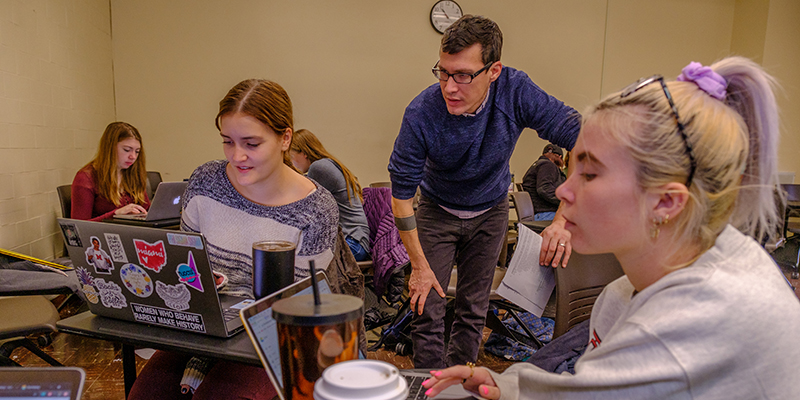

Prosecution Project examines how sociopolitical crimes are prosecuted
Research Computing Support group helps make dataset more reliable
by Heather Beattey Johnston, office for the advancement of research and scholarship
For all the time, effort, and resources devoted to thwarting terrorism, it’s surprisingly difficult to get a complete view of sociopolitical violence in the United States.
For instance,
- The Anti-Defamation League and the Southern Poverty Law Center monitor racist and white nationalist violence.
- The Center for Biomedical Research collects data on attacks against animal testing facilities.
- The University of Maryland tracks international incidents of terrorism in its Global Terrorism Database.
But because none of these groups’ datasets interface with any other’s, information remains siloed and analysis of broader relationships is stymied.
Michael Loadenthal is trying to break down those silos.
A visiting assistant professor of sociology and social justice studies at Miami University, Loadenthal directs the Prosecution Project, which seeks to understand how terrorism, extremism, and hate crimes are prosecuted in the U.S. justice system. The Prosecution Project’s dataset includes all crimes of political violence, without regard to the identity of the targets or the ideology of the perpetrators, so it paints a uniquely comprehensive picture.
“We’re looking to understand the patterns that exist between who a criminal defendant is, who commits crimes motivated by sociopolitical violence, and how that relates to the crime they committed and the way it’s prosecuted,” Loadenthal said.
Altogether, Loadenthal and his project team — which consists entirely of his current and former undergraduate students — account for 46 variables in each case they add to their dataset. Each case is coded by two members of the project’s coding team. After review of the initial coding by at least two senior members of the analysis team, the data are then reviewed by an auditor.
So far, the team has fully coded and reviewed about 40% of the 5,000 cases they have identified. Once the dataset is fully processed, Loadenthal intends to make it available to the public.
Collaboration breaks through roadblocks
Working toward that goal has required Loadenthal to figure a way around some technical roadblocks. One place he turned for help is Miami’s Research Computing Support group, particularly Greg Reese, senior research computing support specialist.
Among other things, Reese developed a custom audit program that Loadenthal says “helps machine some of the irregularity out of the data.” Reese’s program reads the data the project team has collected and checks it against a set of defined rules — about 30 in all — to find irregularities or incongruences.
Certain mistakes, like an extra space typed after a defendant’s name, will cause a computer to classify data incorrectly. (A computer treats “John Jones ” — with a space after “Jones” — and “John Jones” — no space after “Jones” — as two different people, for instance.) Reese’s audit program searches for such mistakes and flags them so they can be corrected to improve the integrity of the overall dataset.
Loadenthal is grateful for Reese’s willingness not only to listen to the specific challenges the Prosecution Project faces, but also to develop custom solutions.
“I’ve seen Greg learn different aspects of new computer languages in order to code what we need,” Loadenthal said. “He’s taught himself new skill sets in order to accommodate us. Instead of trying to use something he’s already familiar with — let’s say C++ — he adapted and learned Python, which is better suited to what we’re doing.”
Students volunteer to work on the Prosecution Project
Reese’s impulse for inclusivity fits something of a theme for the Prosecution Project, which has remarkably diverse personnel. Although most members of Loadenthal’s 60-person team identify as female, they otherwise represent the gamut of student demographics and identities.
“We have a highly diverse research team that closely resembles the world off-campus,” Loadenthal said. “Our students represent a variety of races, ethnicities, nationalities, and religions. They don’t all conform to binary notions of gender. In addition, they represent a broad set of academic majors, from biology to English to political science to sociology.”

Prosecution Project team members (from left) Sarah Carrier, Olivia Sellegren, Meekael Hailu, and Morgan Demboski, discuss data at a work session.
Loadenthal isn’t sure why the Prosecution Project’s team is so diverse. Diversity is more common in the social justice studies and upper-level sociology classes Loadenthal teaches than in the university as a whole, but beyond that, the team’s diversity doesn’t result from any active recruiting strategy. Students self-select to participate in the project — he waits for them to approach him.
The key to the team’s diversity may lie in diverse students’ inherent interest in finding answers to questions about systemic inequalities, which tend not to work out in their favor. Loadenthal said one of his early goals for the Prosecution Project was to explain sentencing disparities. He acknowledges that many members of his team expected to find that nationality, religion, and race play a role.
And while they did find that African-, Asian-, and Middle Eastern-born, Muslim defendants with foreign-sounding names often receive harsher sentences than American-born, Christian defendants of European descent, they also found that simple xenophobia didn’t fully explain the differences. Loadenthal is committed to making Prosecution Project data available to other researchers who can help develop more nuanced explanations.
“This project is the only one that co-mingles and assimilates data points so you can make comparisons between ideologies and not restrict it to one particular movement,” Loadenthal says. “That’s the main goal, to ask questions that aren’t specific to one interest group.”
